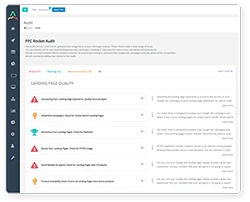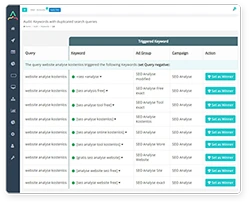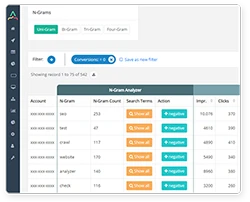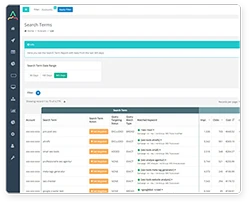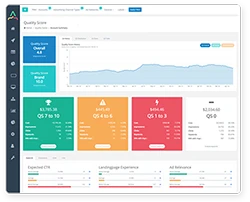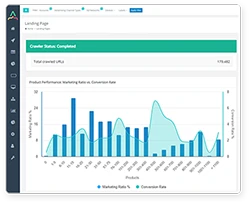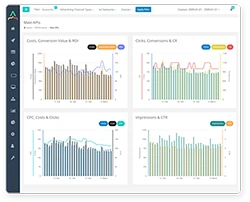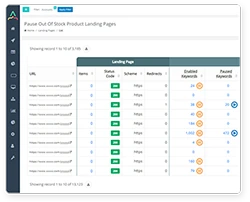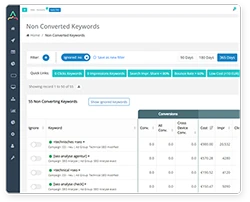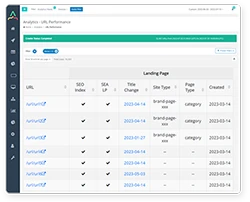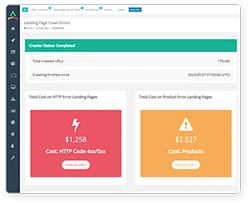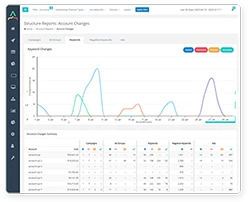Introduction
Feeling stuck in a loop trying to boost your Google Ads performance? Are you on the hunt for a dependable method to sharpen your keywords and enhance the significance of your ads? No need for fretting - we're here to support you! We're introducing you to an extraordinary software called Google Ads NGram Tool destined to reenergize your Google Ads tactics.
In this accessible, engaging guide, we'll plunge into the intriguing world of Google Ads NGram. We'll journey together, unveiling the mystery of what they truly are, how they function, and how their conversion value can be skillfully applied in your ventures. Think of it as an exciting treasure quest, with them and their conversion value being the hidden gems. So, let's kick off our expedition!
Start Creating Better Google Ads
See how PPC Rocket can help you achieve best practices when it comes to Google Ads. Optimize your ad spend with all the tools you need to measure, track, and improve performance.
What Does ‘Google Ads NGram’ Mean?
Google Ads NGram has multiple applications, and while they're mighty useful for recognizing patterns in numbers or other types of data, their true prowess shines when dealing with words or text data. Picture yourself in the
intricate world of computational linguistics, an intriguing field dedicated to understanding and deciphering language through the power of computers. In this world, n-gram analysis
plays a vital role, acting like
ingenious word predictors. Their aim is to anticipate the next word you'll utter, taking cues from the ones you've just used.
You could compare it to finishing someone's sentences in a chat. Like a close companion who can often guess your next words, Google Ads analysis strives to achieve a similar feat, even considering word length as a factor. The singular distinction here is that n-gram analysis is designed to work with an ocean of text or vast amounts of spoken words, using them as building blocks to construct meaningful predictions.
Google Ads NGram: Your Secret Weapon for Enhanced Language Understanding
You might be wondering where 'Google Ads NGram' come into the picture. These tiny bits of sentences help computers understand the context better. They become superstars in the world of NLP, contributing to making interactions between humans and computers more seamless and intuitive. When we have to convert spoken language into written words - something we call speech recognition -Google Ad's consecutive word analysis is our secret weapon. They also come to our aid when we need to figure out the language being used in a chat or a piece of writing, a task we often call language identification. Furthermore, they can also be useful in predicting the 'click-through rate' for online ads by analyzing the language patterns used in the ad text. They are really good at picking out the mood, context, and ongoing word patterns in a text, all without requiring a person to read it.
A single word is like the tiniest piece of the puzzle, and we call it a "1-gram". So, when you look at the single word 'elephant', it's just that - a 1-gram. Now, let's pair up two words. Maybe 'blue elephant'. Now we have ourselves a "2-gram". It's just a fancy name for a duo of words that hang out together in a sentence. Add one more word to the mix, like 'the blue elephant dances', and suddenly, we've got a "4-gram". It's a four-word phrase that gives us a fuller picture. Imagine this concept applied to the world of text data you enter when you search for something on Google. Let's dive into it...
Search phrase: "Healthy Meal Plans"
1-Grams: "Healthy", "Meal", "Plans"
2-Grams: "Healthy Meal", "Meal Plans"
3-Grams: "Healthy Meal Plans"
Google Ads N-Grams: Understanding Single Words and Phrase Teams
Consider "1-grams" as single, unique words. These words can be used like arrows aiming at specific keywords. For instance, in your "ad group word analysis", you might have words like "healthy", "meal", and "plans". Now, if we step up the game and look at "2-grams", "3-grams", and even "four-word phrase" or "4-grams", they're like creating little teams of words. These "four-word" teams help you create focused ad groups and campaigns for folks who are on the hunt for wholesome meal plans.
Imagine being able to get a quick peek into the labyrinth of your audience's thoughts. Think about it - you're essentially learning their private dialect, uncovering their distinct preferences. Seeing these longer phrases and repetitive expressions in the data stemming from your marketing endeavors, it's almost as if you're learning to speak their hidden language.
Once you've cracked this clandestine cipher, what you have on your hands is no less than a formidable instrument, comparable to a versatile currency symbol. With this tool, you can then tailor your advertisements within a certain date range to sound like a heart-to-heart chat between long-standing companions. The core aim here, you see, is to ensure your promotional content resonates perfectly with your audience - to make it both min relevant and appealing throughout the chosen date range, much like the universal appeal of a currency symbol.
How Google Ads NGram Can Boost Your Google Ads Campaigns
Google Ads NGram, utilized in phrase analysis, is a statistical language model that can help advertisers identify common word phrase sequences. Imagine you're going through a heap of search queries related to your currently active campaigns. You're trying to pin down just the right keywords that'll speak to your audience and create tailored ads while scrutinizing your ad group-level stats. Simultaneously, you're actively on the lookout for those sneaky negative keywords that might hinder the performance of your campaigns. Identifying these negative keywords can help you optimize your campaign's reach and efficiency.
N-gram analysis, instead of spending countless hours combing through data, offers a neat and efficient way to sift through the clutter, providing more insight into your audience's preferences. This technique helps you zone in on the exact keyword gems that your audience responds to. Moreover, Google Ads NGram analysis can highlight any potentially harmful keywords that could inadvertently guide you down an unprofitable route, thus protecting you from squandering money on ineffective advertisements. By providing a broader view of word patterns, it offers more insight into profitable marketing strategies.
There are a few ways in which Google Ads Phrase patterns can be used for the benefit of your Campaigns:
Analyzing search queries
Identifying the right target keywords for your audience
Identifying negative keywords
Word Count Analysis& Search Queries
With tools like the PPC Rocket N-Gram Analysis, you can use Ngram-based Google advertising to analyze search queries and understand searcher intent. This form of account word analysis can be crucial in optimizing your campaigns at scale and discovering potential new keywords to target. Suppose you're focusing your efforts on the keyword "luxury apartments". In that case, it might be a smart idea to consider similar phrases that convey the same essence. For instance, think about incorporating "upscale apartments" or "high-end apartments" into your content. These words carry a similar weight and prestige as "luxury apartments," expanding your content's reach without diluting its meaning. By doing this, you're casting a wider net to attract potential readers or customers who might use different terminology but are seeking the same kind of premium living experience.
Identifying the Right Target Keywords for Your Audience
Google Ads keywords sequence can act like a compass in the vast sea of words, helping you to analyze and pinpoint the frequently used word sequences in related searches. Analyze Google Ads NGram so you will catch a glimpse of patterns and what's in vogue in terms of user behavior. Let's say, for example, you find out that people who type in "best sushi near me" also punch in "Japanese cuisine". This offers a wonderful chance for you to aim your advertisements at those who have a keen interest in Japanese dishes.
To explain further, imagine this as a tool that allows you to peek into the online behavior of users. When someone searches for "best sushi near me", the tool observes this. Later, if the same user searches for "Japanese cuisine", the tool notes this connection. The beauty of it all is that you're now in the know about what your potential customers are interested in - and that's Japanese food, in this instance.
Identifying Negative Keywords
For instance, consider this scenario: if you're in the business of selling luxury timepieces, it might be a smart move to pivot and create new ad groups that specifically target your high-end audience. How would this work? Well, this strategic shift could involve intentionally avoiding phrases like "budget watches" or "reasonably priced watches." You may wonder, why is this beneficial. The rationale behind this move is simple. By consciously focusing your new ad groups on the luxury market, you could potentially sidestep the pitfall of wasting capital on advertisements that won't drive the upscale sales you're ultimately aiming for.
Effectively utilizing 'Google Advertising word combinations' in your campaign word analysis is not simply a straightforward advertising tool; rather, it's a unique method that allows you to communicate efficiently and genuinely connect with your audience. Furthermore, it plays a crucial role in enhancing your digital campaign's potency. By keenly keeping a close eye on active campaign-level stats, particularly those that include word count, you are in a position to quantify this effectiveness. Therefore, consider this analysis not just as a tool, but also as your supportive assistant in the intricate labyrinth of the digital universe, always ready to provide you with vital data insights to guide and improve your active campaign's performance.
Google Ads Ngram: Tools & Resources
If you're taking your first steps into the vast universe of Google Ads keywords sequence and feeling a touch unsure about where to kick things off, fret not! There's an ocean of user-friendly tools and supportive resources at your fingertips, all poised to help you navigate this exciting journey. These can guide you in discovering the perfect keywords.
Google Keyword Planner
Imagine this as a trusty sidekick that helps you find the exact words and phrases potential customers use when they're searching for a service or product like yours online. It's like having your personal decipher of the Internet's language, isn't it? Additionally, with a handy tool like a Google Sheet URL, you can efficiently organize and track these valuable insights. If you're scratching your head wondering what Google Ads NGram are, think of them as close-knit word cliques that frequently appear together. These 'friendly phrases' carry significance, particularly when they're connected to your line of work. By utilizing the Google Keyword Planner and a Google Sheet URL in your arsenal of tools, you're able to align your business's language with that of your clients, enhancing communication and understanding.
Google Trends
Think of Google Trends as an intriguing tool. In essence, it acts much like a personal seismograph for the tremors of Internet language, diligently tracking the rise and fall of specific phrases or word clusters over time.
Consider Google Trends as a type of barometer, gauging the interest levels in various topics or keywords over a certain period. As you would apply a 'var currencyFormat' in a program to adapt to different monetary systems, use Google Trends to adapt to the shifting interests on the internet. It's like having a pulse on the internet chatter, helping you to figure out what's 'in' and what's 'out' in your industry. By monitoring these shifts in interest, you can tweak and refine your approach to better match the current trends.
Google Analytics
offers a treasure trove of data about the search terms people are using to find your website, including the specific search queries, even down to single words, they type into their search engine. These search terms can show you the exact combination of words that people use in their search query when they stumble upon your site. The query count, which is a measure of how frequently these terms are used, can offer additional insight. By understanding these single words, search terms, their respective query counts, and the ability to remove searches that are not relevant, this data can give you a deeper understanding of what brings people to your digital doorstep.
Feel free to connect with us at PPC Rocket
We're thrilled at PPC Rocket to unveil our cutting-edge innovation. This advanced tool, smoothly integrating with your Google Ads Accounts via the Ads API, analyzes your search terms report for a defined date range daily. By populating and optimizing these statistics with the 'Google Ads N Gram,' you enhance the performance of your campaigns and secure a competitive edge in your Google Ads performance.
How to Use Google Ads NGram…
Let's prepare for our n-gram analysis-based Google advertising analysis journey:
Install Python on your computer
A Google Ads account with 3+ months of search campaign data.
A Google Ads N Gram word count Analysis script or a developer.
All you need to do is head over to your Google Ads account. Once you're in, a useful trick you can use is Google Ads scripts, specifically "var campaignNameContains" and "var printLine" for output, which automate common procedures and interactions in your account for better account-level stats, output arrays, and word count analysis. Be ready to encounter the "query count", a valuable metric in your Search Query report. But don't be surprised if you encounter an "error writing not enough space" message, it's just a minor hiccup and easily resolved by optimizing your account storage. With your query count in hand, proceed like an adventurer to snag a detailed Search Query report. Your journey continues as you head over to the 'Reports' section.
When you're dealing with a large dataset, such as one where key filtering variables like "var campaignNameDoesNotContain" or "var AdGroup" come into play, it's important to utilize "headers var calcStatNames" effectively to manage the data. You might find that processing all that information takes a bit more time than usual, but this is a typical occurrence given the volume of the dataset.
Following the program's sleight of hand, you'll be welcomed by a spreadsheet teeming with data derived from Google Ads' consecutive word analysis, including the query count. Here, "var queryrow", along with "var wherestatements", becomes your most valuable tool to sift through the avalanche of information, where the query count can further refine your search.
Deciphering Google Ads N Gram: Harnessing Search Queries
The report you're holding isn't just a jumble of figures and columns, including the vital 'query count', 'var clickthreshold', and 'var numberofwords'. It's more like a secret map, a key that opens the door to possible enhancements for your project. With 'var printline', this report can print crucial lines of data, making it easier for you to analyze n-grams. Armed with a 'valid spreadsheet url', you can unlock the treasure trove of statistics it hosts.
The 'search terms' can help us understand the frequency of 'search queries' and identify the most common and popular ones, allowing us to pinpoint areas that need adjustment or optimization. In the forthcoming section, we'll explore the myriad of ways you can harness this report, specifically the 'search query', 'search terms', and 'number of words' statistics, as well as utilizing 'var printline' to hone your analysis. Who knows, these small changes could potentially make a universe of difference! So, keep your eyes peeled and stay with us!
Hold On! This Sounds Way Too Complicated,
Nobody wants to download search term reports filled with hundreds of thousands of search queries, nor do they want to hire a developer, or install Python! This is exactly why we provide an easy-to-use out-of-the-box tool at PPC Rocket for handling your "search query" needs. Give it a try and use our free trial without any risk!
4 Top Tips on Implementing the Results of Your Google Ads N Gram Analysis on “Word Phrase”
Starting with the highest spending phrases and evaluating their search query performance over the defined date range is a great way to spot any outliers for CPA, MR, CR or ROAS. You can filter your reports to non-convertors, which will also highlight areas of poor spending, perhaps pointing out specific N-Grams that continually underperform.
For example, you might realize that the ngram 'flat' consistently performs badly, indicating that most relevant people searching prefer to use the word ‘apartment’. In this context, consider setting a impression treshhold to better monitor the performance of your keywords. Once these unproductive String of words has been identified by assessing their search query performance, you can add them as a negative phrase match keyword in your Google Ads. This means that your ad won't show for searches that include the phrase of your negative keyword, saving you from wasting money on clicks from irrelevant searches in the future.
After you've made these adjustments, use the N-Gram Tool to cross-reference and verify the changes in your report bi-weekly. Filter the report to see the most productive ones. Once you’ve identified some you can add them to your campaign if you are not already targeting or increase spending on any you feel would be worthwhile.
Once you have identified productive Google Ads NGram to target within your currently active ad groups using search terms, it's time to start creating ads that make use of them. Remember, your ad copy and landing pages should be highly relevant to the search terms you're targeting, including this variable. Don’t forget to test and track your results over time. Try out different search terms and see which ones perform the best.
Final Thoughts
If you are hoping to give your Google Ads a bit of a boost, you might find your secret sauce in the form of Google Ads N Gram. That's why many users use the PPC Rocket Google Ads NGram Tool to do the difficult part for them. With our easy-to-use tool, which not only analyzes but also adds significant depth to your Google Ads performance. Simply connect your Account or MCC with PPC Rocket and we can begin importing and analyzing your data through clever automation! This tool adds unparalleled clarity to your campaign. Or, if you would prefer, outsource the whole project to one of our specialist consultants.
Start Creating Better Google Ads
See how PPC Rocket can help you achieve best practices when it comes to Google Ads. Optimize your ad spend with all the tools you need to measure, track, and improve performance.
Share with
Articles
Discover New PPC Marketing Tips, Strategies, and Insights
APRIL 04, 2023

A Comprehensive Guide to Google Ads Campaign Management - Part 2
Learn advanced Google Ads campaign management strategies to maximize ROI and increase conversions. Part 2 covers automated bidding, ad scheduling, ad copy and landing page optimization, audience targeting, and regular monitoring.
DECEMBER 17, 2022

Google Ads Specialists: How They Can Help Your Business
It is easier and more cost-effective than ever to set up an online business. Here Google Ads Specialists can benefit your business to grow.
MAY 19, 2023

Google Ads: Overcoming Challenges for Small Businesses
With the rise of digital marketing, small businesses have been allowed to compete with bigger corporations. Keep reading the article to learn more.
JUNE 13, 2023

A Guide to Setting up Google Ads for Your E-commerce Site
In this blog post, we will discuss how to set up online store Google Ads for peak performance. Check this out!
4.7 Star (104 reviews)
Customer rating
Start Creating Better Google Ads
See how PPC Rocket can help you achieve best practices when it comes to Google Ads. Optimize your ad spend with all the tools you need to measure, track, and improve performance.
Try PPC Rocket for Free
